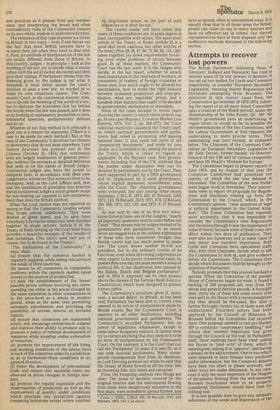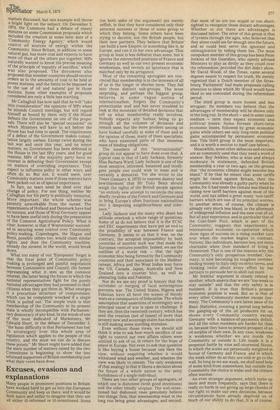Attempts to recover lost powers
The British Parliament (following those of Germany, Holland and Denmark) has tried to recover some of its lost powers of decision. It has set up two bodies, for Lords and Commons respectively, to consider 'European Secondary
Legislation,' meaning mainly Regulations and Decisions emanating from Brussels. The initiative in this matter came from the Conservative government of 1970-1974, folloWing the report of an all-party Select Committee (also a creation of the Heath period), under the chairmanship of Sir John Foster, QC, MP. Mr Heath's government gave an undertaking, in vague terms, to accept as far as possible the recommendations of the two Committees, and the Labour Government at first repeated the undertaking in more precise terms. That undertaking was later revised, as explained below. The Chairman of the Commons Committee on European Secondary Legislation is Mr John Davies, former banker, ex-DirectorGeneral of the CBI and of various companies, and later Mr Heath's 'Minister for Europe.'
The Committees began to present reports in June 1974, and by August of that year the Commons Committee had presented ten reports, of which the last was debated in December. The Committee of the new Parliament began work in November. Their instructions were to report on proposals for Regulations and Decisions coming up from the Commission to the Council, which, in the Committee's opinion, "raise questions of legal or political importance to the United Kingdom." The Foster Committee had reported, quite accurately, that it was impossible to consider the Commission's own Regulations and Decisions (though it saw the importance of some of them), because some of them come into effect within two days of publication. They were also too numerous and in some cases of only minor and transient importance. Both Lords and Commons have specialised staffs who, with their Chairmen, decide what to ask the Committees to look at, and give evidence before the Committees. The Committees then decide which documents shall be brought to the attention of Parliament.
Nobody pretends that this process has been a success. When the Committee of the present House of Commons began its work, it found a backlog of 250 proposals -left over from the recess and general election periods. A fortnight later, thirty-six of these and some newer ones were sent to the House with a recommendation that they should be discussed. But after a further fortnight, twenty-six of them were still undiscussed. Fourteen others had been approved by the Council of Ministers in Brussels before the Committee had received them. One proposal seemed to one pro-Market MP to constitute "unnecessary meddling," and others that seemed important had gone through the Council on the nod. In Parliament itself, three methods have been tried: asking the House to 'take note' of them, which is meaningless; asking it to 'approve'; and having a debate on the adjournment. One or two which were debated in both Houses have produced useful information, but the Commons debates have been too short to please anybody, and other ways are under discussion. In any case, even if only the most important of the Niagara of documents flowing from the well-meaning Brussels busybodies were to be properlY considered, Parliament would have time for nothing else. It is not possible here to give any adequate indication of the scope and importance of the matters discussed, but one example will throw a bright light on the subject. On December 3, 1974, the Commons had a debate of ninety minutes on some Commission proposals which included the creation at some later date of a 'Community Energy Agency,' which would control all sources of energy within the Community. Since Britain, in addition to some natural gas, has more coal and expects to have more oil than all the others put together, MPs naturally wanted to know the precise meaning of the principle of 'equality of sacrifice,' which was also proposed. The document also proposed that member countries should receive orders as to the amounts of coal to be held at Power stations, and the limits to be imposed as to the use of oil and natural gas in those stations. Some other examples of proposals considered are only a little less startling. Mr Callaghan has now said that he will "take into consideration" the opinions of MPs when he attends Council meetings, but will regard himself as bound by them only if the House defeats the Government on one of the proposals. There will also be "special occasions" on which Ministers will have to act before the House has had time to speak. The requirement of a defeat of the Government makes consultation largely useless. Except twice during the last ,war and once this year, and on minor matters, no Government has been defeated in the House in the last fifty years, and for good reasons.. MPs of the majority party have no interest in defeating their Government except on matters of overriding importance. They expect to influence policy in other ways, and often do so. But not, it would seem, over Community matters, even if those matters have been picked out as of special importance.
In faet, no tears need be shed over that change of policy. For one thing, neither Mr Callaghan nor his party is politically immortal. More important, the whole scheme was patently unworkable from the outset. The experiments of Holland and Denmark have had no success, and those of West Germany appear to have been useful only during the preparation of the Common Agricultural Policy. What is clear, however, is that if Westminster succeeded in securing some control over Community Policy-making, Copenhagen, the Hague and Bonn, possibly others too, would claim similar rights, and then the Community machine, already the slowest in the world, would break down.
What too many of our 'Europeans' forget is that the focal point of Community policy making is prolonged and painful negotiation between Commission and Council, the former representing what it. sees as the common interest, the latter being the forum in which the national representatives fight for the purely national advantages they had promised to their citizens when they got them in. What emerges is a precarious structure of compromises, Which can be completely wrecked if a single brick is pulled out. The simple truth is that membership of the Community in its present state is wholly incompatible with Parliamentary democracy of any kind. In the words of one of the most dedicated of Marketeers, Mr Edward. Short, in the debate of December 3, "the basic difficulty is that Parliament has lost its sovereignty over this whole area of legislation which applies to the people of this country, and the most we can do is discuss these points." Mr Short might have added that the mere number of matters raised by the two Committees is beginning to show the less informed supporters of British membership just what their votes have done.











































 Previous page
Previous page